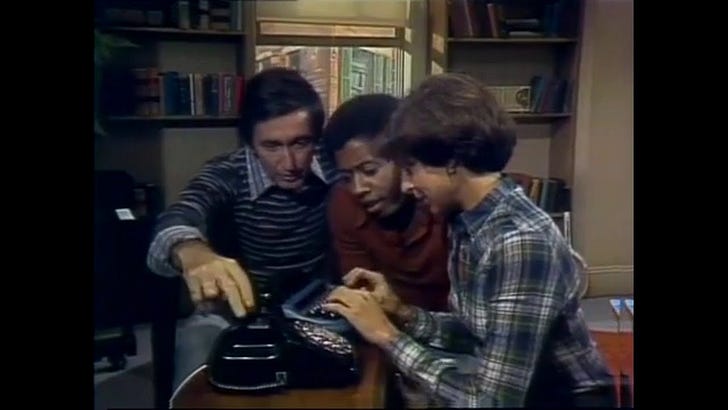Today's DHR - Deaf Actor Linda Bove Officially Joins "Sesame Street" Cast
Sesame Street Welcomes Deaf Character in 1972
Linda Bove first appeared on “Sesame Street” in April, 1970, as an actor for the National Theatre for the Deaf. She officially joined the cast on January 24, 1972, as Sesame Street’s librarian, and appeared regularly on the show until 2002.
Bove’s character communicated using American Sign Language (ASL), except for two times when we heard her thoughts via voice-over by Ivy Austin. Her segments were designed to teach viewers about ASL and what it’s like to be Deaf. During Bove’s time on the show, viewers saw Linda:
Communicate with other actors using ASL (including Barkley the Dog, who understood ASL)
Sign songs while other actors sang them, and leading groups who were signing songs.
Use a teletypewriter (TTY) to call her relatives
Bove helped the “Sesame Street” writers get over what she perceived as an uncertainty about how to best write the Linda character.
“When I joined the cast I found the writers would write about 'How would a deaf person do this?' 'How does a deaf person do that?' And it was just related to my deafness and it didn't feel like they were treating me as a person. I found my character one-dimensional and kind of boring. It showed how brave a deaf person was to do this and that in everday life. I said it was no big deal. I have a sense of humor; why don't you show that? I can be angry over something. Show that I can have a relationship with another person. Maybe a love relationship with Bob. It's not perfect, but... We do have misunderstandings over sign language, make fun of it, and show the funny side of it. It's OK.”
Linda Bove’s character on “Sesame Street” was important because she:
Taught viewers that Deaf people (and disabled people in general) are just like everyone else - living lives in their communities and filling a variety of roles, with friend and family relationships.
Raised awareness that sign language is a way of communicating with Deaf people that anyone can learn.
Opened the door more more Deaf representation in television and theatre. She even cofounded a sign language-based theatre companty, Deaf West, with her husband in 1991.
In this 1977 “Sesame Street” segment, Linda uses a TTY to call her father.
“Sesame Street” has always been great at teaching its viewers about diversity and inclusion. It will be missed if it can’t find a new streaming home after this season, now that Paramount has decided not to make new episodes.
I used these sources to research this article:
Harrington, Barbara, and Linda Bove. “Non-Traditional Casting Update: Interview with Linda Bove.” TDR (1988-), vol. 35, no. 2, 1991, pp. 13–17. JSTOR, https://doi.org/10.2307/1146085. Accessed 21 Jan. 2025.
Muppet Wiki - Linda —> https://muppet.fandom.com/wiki/Linda
Muppet Wiki - Linda Bove -→ https://muppet.fandom.com/wiki/Linda_Bove
“Sesame Street” returns for a new season with a focus on emotional well being —> https://www.latimes.com/entertainment-arts/tv/story/2025-01-16/sesame-street-season-55-emotional-well-being





Hi Craig! Thank you for the comment, and that video, which I LOVED, and that I may start sending to people who say things to me like, "Isn't it great that you're out and walking today!" Once I learned about inspiration porn, I thought, "Oh God,I hope I haven't been talking to people that way!" and now I - gently - try to call it out when I see it from people who I know are otherwise trying their best to treat disabled people as their equals, so that they're aware of it and hopefully at least think about it. I like Stella Young's perspective on it as well: https://www.youtube.com/watch?v=8K9Gg164Bsw
Awesome article Sarah. Sesame Street was always way ahead of most media. I didn't realize we were in danger of losing it. It's something I just sort of always assumed would always be there. What a strange world it would be to not have Sesame Street in it. Linda's story is one that I've seen played out time and time again, even now, 50 years later. I used to be involved with a group called People First who advocated for things like doing away with tokenism and focusing on people and their interests and uniqueness first, not their disability. Dave Hingsburger, who you and I were discussing recently, was the first person I heard use the term "disability porn." He defined that as people who feel good about themselves by saying and/or thinking things like "you're so brave" or "you're an inspiration" when they see someone with a visible disability doing mundane, everyday tasks like buying toilet paper, which is depicted in this video that I always enjoy sharing: https://youtu.be/j-kDsBrHAYs?si=gvEeFxp2k_WdtdAd
Great work on the article. Keep it up!